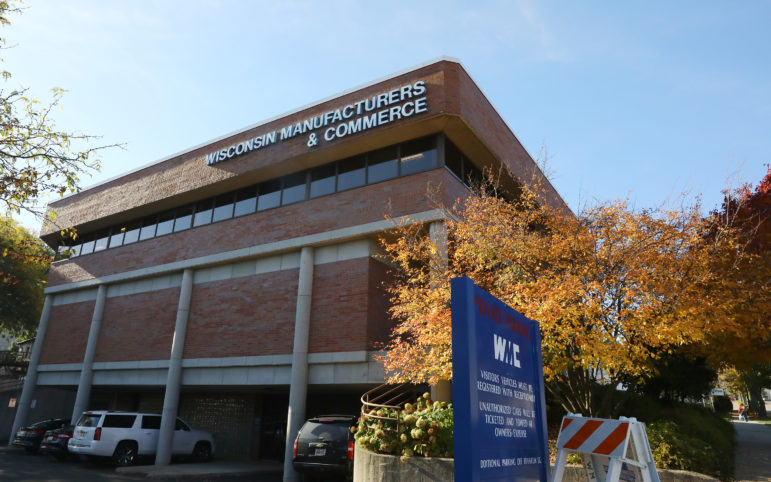WMC Still Leads In Capitol Clout
Massive spending on campaigns and lobbying by state’s biggest business group.

Wisconsin Manufacturers and Commerce. Photo by Riley Vetterkind / Wisconsin Center for Investigative Journalism.
Wisconsin Manufacturers & Commerce (WMC) is the state’s largest business organization and consistently one of the biggest spenders on outside electioneering activities and on lobbying.
WMC was once even referred to as one of the “four horsemen” – a Biblical reference to the Four Horsemen of the Apocalypse who signal the end of the world – in a 2002 criminal complaint against former Republican Assembly Speaker Scott Jensen because of its influence at the State Capitol.
The group secretly raised and spent about $32.7 million between January 2006 and December 2017. And it doled most of that money out on broadcast ads to support conservative and Republican candidates and attack their Democratic opponents.
WMC’s election spending has been key to the GOP stranglehold on power. It succeeded in packing the seven-member Wisconsin Supreme Court with five conservatives; helping Republican Gov. Scott Walker win three elections, including a bitter recall contest in 2012; developing the GOP’s current large majorities in the Assembly and Senate; and electing Republican attorney generals for the past 12 years.
During those elections, candidates and outside special interest groups that sponsored issue ads to support or oppose a candidate were not allowed to coordinate negative broadcast ads and other electioneering activities. But that changed in 2015 when the state Supreme Court’s conservative majority ended a John Doe probe into campaign coordination between Walker and special interests during the 2011 and 2012 recall elections for governor, lieutenant governor and 13 state Senate seats. The high court’s ruling also struck down key elements of the state’s campaign finance law.
WMC reportedly was among numerous ideological and trade organizations that were subpoenaed in the John Doe investigation. And WMC and two other groups connected to the investigation spent an estimated $8.3 million between 2007 and 2013 to help elect four of the high court’s conservative members at the time.
Walker and the GOP-controlled legislature then followed up the court’s decision by passing laws to further weaken campaign finance laws and eliminate the nonpartisan Government Accountability Board, with support from WMC and other powerful special interests.
In addition to its outside election spending, WMC also funnels direct contributions to candidates through a political action committee (PAC) and a conduit, which is a legal check-bundling outfit for individual contributions. Since January 2007, WMC PAC and large individual conduit contributions totaled about $563,000 to legislative and statewide candidates and fundraising committees. All but $10,850 — 98 percent of the money –went to Republicans.
The top recipients of WMC’s PAC and conduit contributions were:
Walker, $149,370;
Republican Assembly Campaign Committee, about $54,470;
Committee to Elect a Republican Senate, $47,400;
GOP Senate Majority Leader Scott Fitzgerald, of Juneau, $22,970;
Republican Sen. Tom Tiffany, of Hazelhurst, $18,780.
Many of WMC’s conduit contributions are likely made by the owners and executives of its 3,500-member businesses that hail from more than a dozen special interest groups, including business, manufacturing, energy, insurance, health care, transportation, construction, real estate, finance, tourism, agriculture, road builders, natural resources and telecommunications.
WMC is also one of the top-spending special interest groups lobbying at the State Capitol. Since 2007, the group has spent more than $5.2 million to push a pro-business agenda that includes lower taxes on businesses and the wealthy, environmental deregulation, weak campaign finance laws, and anti-worker and anti-consumer measures. Some of the state laws fueled by WMC’s lobbying and election spending include:
A $3 billion state giveaway and breaks on environmental laws to Foxconn, a Taiwanese company that promises to build a large manufacturing plant in Racine County;
Severely restricting public employee collective bargaining rights, which drew national attention and generated massive protests at the State Capitol and historic recall elections for governor, lieutenant governor, and 13 state Senate seats in 2011 and 2012;
A right-to-work law that prohibits requiring workers to make payments to unions as a condition of employment;
Overhauling the state’s civil service hiring process by eliminating the requirement that job applicants take exams and shortening the process used by employees to appeal their discipline or dismissal by more than half, among other things;
Loosening several state environmental safeguards for mining. The measure was requested and largely developed by Gogebic Taconite, a subsidiary of an out-of-state mining company that wanted to develop a massive open-pit iron mine in northern Wisconsin. The company’s plans have since fallen through;
Repeal of the state’s moratorium on nuclear power plant construction;
Reducing state lead paint inspection and testing requirements;
Restricting the legal options for victims of asbestos-related injuries who sue asbestos companies for damages;
Limiting liability against long-term care providers in civil lawsuits, placing stricter limits on product liability lawsuits and capping the amount of court-awarded non-economic damages;
Eliminating compensatory and punitive damages for racial, sexual and other acts of employment discrimination or genetic testing;
Doubling the previous limits on individual campaign contributions to legislative and statewide candidates, allowing unlimited contributions to political action committees, allowing candidate committees to coordinate with outside advocacy groups, allowing corporations to donate to political parties, and eliminating meaningful occupational and employer information candidates must report about their donors on campaign finance reports.
Campaign Cash
-
Outside Groups Spent Record $28.8 Million on State Supreme Court Race
 May 7th, 2023 by Erik Gunn
May 7th, 2023 by Erik Gunn
-
Top 20 Donors to State Political Parties
 Apr 4th, 2023 by Peter Cameron and Hina Suzuki
Apr 4th, 2023 by Peter Cameron and Hina Suzuki
-
$38 Million Spent on High Court Race
 Mar 29th, 2023 by Erik Gunn
Mar 29th, 2023 by Erik Gunn





















